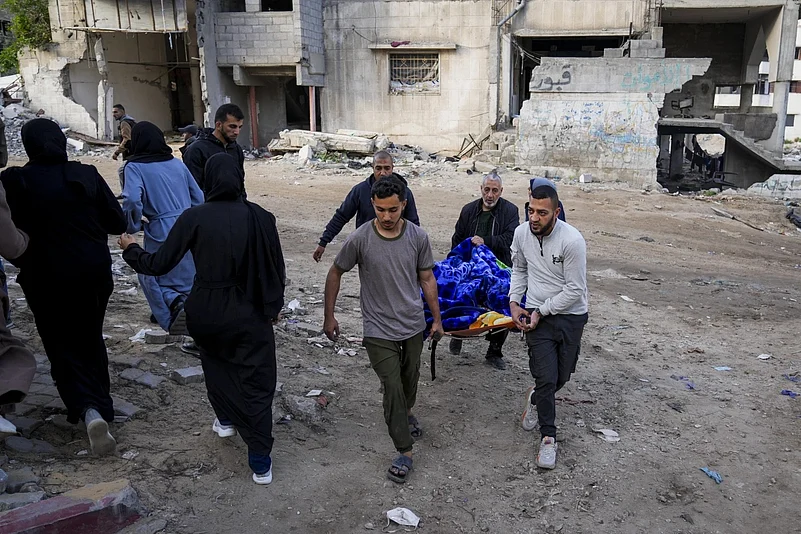At least 60 people were killed across Gaza on Monday as Israeli air and ground operations intensified ahead of key ceasefire talks between Israeli and U.S. officials in Washington, a Reuters report said.
Israeli Strategic Affairs Minister Ron Dermer, a close aide to Prime Minister Benjamin Netanyahu, is scheduled to begin meetings with Trump administration officials on Tuesday. His visit comes shortly after President Donald Trump urged both parties to “make the deal in Gaza” and secure the return of hostages.
Despite diplomatic efforts, the situation on the ground remained dire. The Israeli military issued new evacuation orders to residents in northern Gaza, sparking another wave of mass displacement.
“Explosions never stopped. They hit homes, they hit schools. It felt like the ground was shaking,” said Salah, a 60-year-old father of five from Gaza City. “They talk about peace on TV, but here we only see destruction.”
“In every ruined classroom and shattered wall, there was someone trying to live with dignity,” added Amani Swalha, a displaced woman standing in the debris of a bombed school. “We are more than just headlines and statistics.”
According to Gaza health authorities, 58 people were killed on Monday alone, with 22, including women, children, and a local journalist, dying in an airstrike on a beachfront café. The Palestinian Journalists Syndicate reported that more than 220 journalists have died in the conflict since October 2023.
In the eastern Zeitoun suburb of Gaza City, Israeli tanks advanced while aircraft targeted several schools after issuing evacuation orders. At least 10 people were killed in Zeitoun and another 13 southwest of Gaza City, some reportedly by gunfire.
The Israeli military said it targeted Hamas infrastructure, including command centers in the north, and claimed it had taken steps to reduce civilian casualties. There was no immediate comment on the café bombing or deaths in the southwest.
The new wave of strikes follows an announcement by Israel’s military chief that the current ground operation is nearing its strategic objectives. Meanwhile, Netanyahu has stated that opportunities have emerged to recover the remaining 20 hostages believed to be alive.
Talks led by Qatar and Egypt have resumed, but no date has been confirmed for the next formal round of ceasefire negotiations. Hamas insists that any deal must include an end to the war and full Israeli withdrawal from Gaza - conditions Israel has firmly rejected. Israel maintains that it will not stop military operations until Hamas is dismantled and disarmed.
Israeli Foreign Minister Gideon Saar said the country has agreed to a U.S.-backed proposal for a 60-day ceasefire and hostage release, but emphasized that the next move lies with Hamas. “Israel is serious about reaching a deal,” he said.
Visiting Jerusalem, Austrian Foreign Minister Beate Meinl-Reisinger described the humanitarian crisis in Gaza as “unbearable” and urged both sides to agree to a ceasefire. “The suffering of civilians is increasingly straining Israel’s relations with Europe,” she warned, calling for the release of hostages and unobstructed aid access.
Israel maintains that aid is allowed into Gaza, blaming Hamas for stealing supplies, an accusation Hamas denies, instead accusing Israel of weaponising hunger.
Under the current U.S. proposal, Hamas would release half of the hostages in exchange for Palestinian prisoners and the remains of those killed. The remaining hostages would be released in a second phase, with negotiations to bring the war to a close.
The conflict began on October 7, 2023, when Hamas militants stormed into Israel, killing 1,200 people, mostly civilians, and taking 251 hostages. Since then, Israeli operations in Gaza have killed over 56,000 people, most of them civilians, according to Gaza’s health ministry, and displaced nearly the entire population of 2.3 million.
The United Nations estimates that more than 80% of Gaza is now either under Israeli military control or subject to active evacuation orders.














